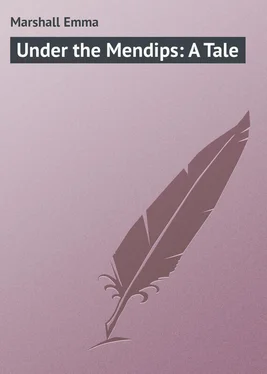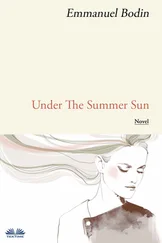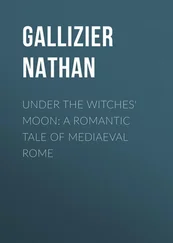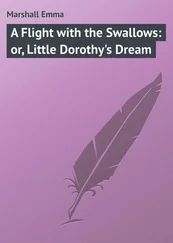Emma Marshall - Under the Mendips - A Tale
Здесь есть возможность читать онлайн «Emma Marshall - Under the Mendips - A Tale» — ознакомительный отрывок электронной книги совершенно бесплатно, а после прочтения отрывка купить полную версию. В некоторых случаях можно слушать аудио, скачать через торрент в формате fb2 и присутствует краткое содержание. Жанр: foreign_prose, на английском языке. Описание произведения, (предисловие) а так же отзывы посетителей доступны на портале библиотеки ЛибКат.
- Название:Under the Mendips: A Tale
- Автор:
- Жанр:
- Год:неизвестен
- ISBN:нет данных
- Рейтинг книги:5 / 5. Голосов: 1
-
Избранное:Добавить в избранное
- Отзывы:
-
Ваша оценка:
- 100
- 1
- 2
- 3
- 4
- 5
Under the Mendips: A Tale: краткое содержание, описание и аннотация
Предлагаем к чтению аннотацию, описание, краткое содержание или предисловие (зависит от того, что написал сам автор книги «Under the Mendips: A Tale»). Если вы не нашли необходимую информацию о книге — напишите в комментариях, мы постараемся отыскать её.
Under the Mendips: A Tale — читать онлайн ознакомительный отрывок
Ниже представлен текст книги, разбитый по страницам. Система сохранения места последней прочитанной страницы, позволяет с удобством читать онлайн бесплатно книгу «Under the Mendips: A Tale», без необходимости каждый раз заново искать на чём Вы остановились. Поставьте закладку, и сможете в любой момент перейти на страницу, на которой закончили чтение.
Интервал:
Закладка:
"There are the two girls we saw in the cathedral Falconer; one is your sister."
Before Melville could rejoin, Joyce had turned, and now came forward to her brother with heightened colour, saying:
"I think my father will be ready to go home now, Melville, and we had better go back to the Swan."
Charlotte all this time had been posing before her grand cousin and his friend, hoping to attract his attention.
"Introduce me, Falconer," Mr. Arundel said, standing with a native grace which characterised him, with his hat in his hand.
"My sister," said Melville, carelessly, "and my cousin, Miss Benson;" and he was passing on to continue his walk towards the Bishop's Fields; but Mr. Arundel did not follow him.
"Your sister says we shall be wanted at the Swan Inn, and must not linger by the live swans."
"Oh, no; we are going to Fair Acres quite independently of my father. I have ordered our carriage; you ought to come to the end of the Moat, there is a fine view of Dulcot."
But Mr. Arundel showed no intention of following his friend. "Nay," he said, "let me see the swans have the last bit of bun. See, they are coming for it. Do you always bring them buns?"
"Not always; but I had a convenient halfpenny left from the change at Willmott's, so I went to buy a stale bun at the little shop in Saddler Street."
"Happy swans to be so remembered!" Mr. Arundel said, as he watched the last wedge of the stale bun gobbled up by the master of the brood, while his wife gave him a savage peck with her black bill.
"It is a pity they are so greedy; it spoils their beauty," Joyce said. Then, with sudden recollection, she said, "Oh! Charlotte, I have forgotten to take Piers' sparrow-hawk to Mr. Plume's. I must go at once to Aunt Letitia's and fetch it. I left it in the basket there."
"Can I go and fetch the sparrow-hawk, Miss Falconer?" Mr. Arundel began.
"Come, Arundel," Melville interrupted, "you and I can stroll round this moat; we are not returning, as I told you, with Joyce."
But Mr. Arundel deliberately turned in the direction in which Joyce was hastening; and Charlotte, much to her cousin's vexation, was left with him.
A muttered exclamation, which was not fit for ears polite to hear, escaped Melville's lips, and Charlotte's soft speeches were lost on him.
"It is so nice to see you here, Cousin Melville. Won't you come and pay auntie a visit?"
Melville had particularly desired to escape a visit to the Vicar's Close, but he began to fear it was inevitable.
"Do tell me about college," Charlotte began. "I am dying to hear, because I have a special interest in college now." This was said with a smile and glance which were meant to make an impression. "And do you wear one of those sweet hoods with snow-white fur round it, Cousin Melville? They do look so pretty!"
"Well – no," drawled Melville, evasively; "I have not taken my B.A. yet."
"Mr. Bamfylde, the new minor Canon at the cathedral, wears one; and it is so charming!"
"Humph!" Melville rejoined.
What were all the minor canons in the world to him that he should care whether they wore fur-lined or silk-lined hoods at their backs?
They had reached the turnstile now leading into the Cathedral Green.
"I say," he began, "I think I must bid you good-bye here, Charlotte. I will call on Aunt Letitia another day, for I must look after the carriage. I am afraid there should be some mistake. I want a pair of greys to post with, and I should not wonder if they tried to pass off two old bays, with their bones just through their skins."
And the next minute the fine gentleman was sauntering off in the opposite direction to poor Charlotte, who went away disconsolate.
Meantime Mr. Arundel and Joyce had walked quickly to the Vicar's Close, and Joyce, having captured her basket with the dead bird, was surprised to find Mr. Arundel waiting for her at the little gate.
"Mr. Plume's shop is in New Street," she said. "It is scarcely to be called a shop, but there are a few stuffed birds in the window. We must go up the steps by the chapel into the North Liberty."
Mr. Arundel was struck with the business-like fashion in which Joyce conducted her interview with Mr. Plume.
He was a little dried-up-looking man, whose front parlour had that peculiar scent which is characteristic of rooms where stuffed animals are kept.
Mr. Plume did not confine himself to birds. A large fox, with gleaming teeth and glassy eyes, stared at the customers from a shelf in a recess by the fire-place. A badger was on another; and owls of all sizes and colours were standing, with one foot tucked up, and a certain stony stare in their great round, unshadowed eyes.
Mr. Plume did not waste words.
"Sparry-'awk," he said "sparry-'awk; it is of not great value, missie. Humph!" he continued, "it's not a rare speciment, but I'll set it up. How's the young gentleman, eh?"
"Quite well, thank you, Mr. Plume; and please have the bird ready by the next time we come into Wells. We must not stop now; but what a noise those men are making."
As she spoke, Mr. Arundel went out to the door, and Joyce, peeping through the cases in the window, saw a cart being dragged up the hill towards the Bristol Road by four rough-looking men. Another huge man sat in the cart, his head lolling upon his breast, evidently the worse for drink. A few wild-looking men and boys and a lean pony followed; and two or three women, with their hair hanging down their backs, brought up the rear; and all were shouting at the top of their voices some rhyme, the drift of which was, that the justices had got the worst of it, and that Bob was free.
"What does it all mean?" Mr. Arundel said.
"Oh, it's only some of the rough Mendip folk. One of 'em was taken up for snaring rabbits, and there was a great row. I suppose the justices have let him off – afraid to do anything else. There is a deal of ill-blood in them parts; and they say it's even worse in the cities than what it is in the country. Dear me!" said Mr. Plume, stroking the back of a stuffed spaniel which was handy. "It's a thousand pities folks can't mind their own business, instead of annoying respectable folks. Good-day to you, Miss Falconer. Good-day to you, sir."
When outside the shop Joyce paused and watched the straggling crowd wind up the steep hill.
"It is dreadful to see people like this," she said, with a sigh. "I must ask father about it; for he has been sitting on the bench to-day. I hope they are not angry with him."
"I hope not," Mr. Arundel said; "they look little better than savages, and would knock any one on the head for a trifle."
"We must make haste," Joyce said, "for father does not like to be kept waiting, and mother expects us home to tea. I dare say we shall get to Fair Acres before you do."
"Why can't we all drive together?" Mr. Arundel asked.
Joyce hesitated a moment, but only for a moment.
"You are thought too grand to drive in our four-wheel," she said, smiling.
"Grand! Who said so?"
"Melville, of course. He said you would be shocked to rumble and jolt over the roads, and that your luggage must go on the roof of the post-chaise."
Mr. Arundel laughed a merry, pleasant laugh, and said:
"I am sorry your brother should have given you such a bad account of me. Poor fellow!"
Joyce looked up quickly.
"Then you don't think exactly as Melville does?"
"No, I hope not," was the reply.
"But he is a friend of yours, is not he?"
"Yes, he is a friend – up to a certain point. Do not think me ungracious."
"Oh! no. I understand."
"Melville thinks a great deal of you, and is so proud that you have come here. I am glad you have come also, now I have seen you, though when I first heard you were coming I dreaded it; and so did mother. But I must not stop to talk any more now, except to ask you to make mother feel as you have made me feel, that you are not so very grand, after all."
Читать дальшеИнтервал:
Закладка:
Похожие книги на «Under the Mendips: A Tale»
Представляем Вашему вниманию похожие книги на «Under the Mendips: A Tale» списком для выбора. Мы отобрали схожую по названию и смыслу литературу в надежде предоставить читателям больше вариантов отыскать новые, интересные, ещё непрочитанные произведения.
Обсуждение, отзывы о книге «Under the Mendips: A Tale» и просто собственные мнения читателей. Оставьте ваши комментарии, напишите, что Вы думаете о произведении, его смысле или главных героях. Укажите что конкретно понравилось, а что нет, и почему Вы так считаете.












